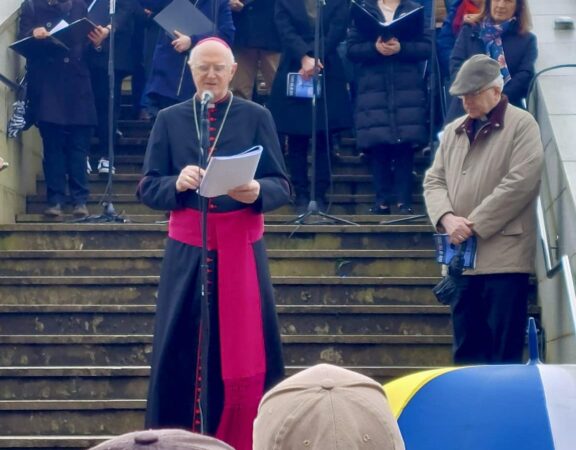FORTIETH ANNIVERSARY OF THE ESTABLISHMENT OF THE PARISH OF OUR LADY OF GOOD COUNSEL, JOHNSTOWN KILLINEY
Homily Notes of Most Rev. Diarmuid Martin Archbishop of Dublin
Church of Our Lady of Good Counsel, 19th May 2014
“For me, one of the most interesting recent reflections on the mission of the Church today was a handwritten note on a single sheet of paper. It was written by someone who most of you, at the time of its writing, had probably have never heard of. Four days after writing the words, his new name had become a household word around the Church: Pope Francis.
The words I draw attention to were the words that Cardinal Bergoglio addressed to the Cardinals gathered in General Congregation just two days before they entered the Conclave. They were simple words, but profound words and words that challenge us. The fact that their author was elected Pope just days afterwards is obviously significant.
Let me look at some of the phrases with you for a few moments and look at what they might mean for a parish community in our days:
“Evangelising pre-supposes a desire in the Church to come out of herself. The Church is called to come out of herself and to go to the peripheries, not only geographically, but also the existential peripheries”.
The Church is called to evangelise, to preach the message of the Gospel. The Church cannot be a closed comfort-zone for the likeminded. It must be a place of real reaching-out to people where they are. It must have the ability able to present the teaching of Jesus Christ courageously and in a challenging way.
Evangelising is not just about keeping things ticking over or leaving people just where they are.
When we say that the Church must reach out to the peripheries this requires, also, that the Church develops an acute ability to identify where the contemporary peripheries our society really are.
Certainly there are the peripheries of poverty and exclusion. Today, these peripheries are not simply in the deprived inner centre areas or on the outskirts of our cities as may have been the case in the past. These peripheries of poverty lie hidden even in the most affluent of our communities and perhaps we do not see them.
There are today many other ways in which people find themselves on the periphery: people are marginalised and hurt; some are seeking for meaning and are being led on false paths in seeking for that meaning. When we fail to bring the message of Jesus Christ effectively to our young people and to our young Christian families, can we not say that we abandon them to the margins of where true fulfilment is to be found?
We all agree that we should be reaching out to the peripheries and we rejoice when Pope Francis gives us examples of how this can be done. It is, however, not easy to reach out to the peripheries. The very term periphery contains a certain sense of being somewhere were we do not fully belong. There are many ways in which all of us feel a certain uneasiness and an inability to speak about our faith to others. We have lost the language of evangelisation and are uneasy at sharing and transmitting the faith, even with those who are closest to us. In order to reach out, we have to allow ourselves to be evangelised, to develop a more personal knowledge of Jesus and to have a relationship with Jesus in our lives so that we can feel at ease and confident in living our faith in a very pluralist society.
When we reach out to the peripheries we are moving not just away from where we feel comfortable but we find ourselves among people who very often have lost contact with the language and culture of faith. The peripheries may even be places where we will not necessarily receive a warm welcome. We must learn the language and the art of evangelization from Jesus himself, who was able to form his disciples even in a culture of hostility. The Gospels constantly mark a distinction between Jesus’ disciples and “the crowd”, a crowd which does not understand his message. But Jesus is always among the crowd with a caring presence, calling them to overcome their prejudices and to begin to reflect on life in a deeper way.
There is certainly a sense in which we all recognise that with the drop in religious practice, there is a new need, and an urgent need, to reach out in a different way. There are many practical reasons which will call us to reach out. But Pope Francis’ message is not just about practical needs. It is more radical. He notes:
“When the Church does not come out of herself to evangelize, she becomes self-referential and then gets sick”.
These are striking words. Pope Francis is saying that a Church which becomes closed in on itself is a sick Church. A Church which does not reach out is not just an ineffective Church: it is a Church which is harming itself in its real essence. The Pope stresses that a closed self referential Church, has lost its way, because it has really lost its contact with Christ.
When the Church is self-referential, inadvertently, she believes she has her own light; the self-referential Church keeps Jesus Christ within herself and does not let him out.
I rarely like to quote myself but as I was looking through your Parish website the other evening I came across words that I spoke here on the occasion of the re-opening of this Church in 2005:
“A parish community, especially in our times, must be a community which reaches out to all. It must be a community which welcomes back, rather than cuts off… The Church by its nature must be open and it must open a path of welcome for those who are still journeying, those who are still seeking, of those who are still weak, of those who are sinners.” That is still my advice this evening as we celebrate the fortieth anniversary of the establishment of this great parish. I remember well the construction of this Church. I remember the laying of the foundation stone. It was a very muddy site and an isolated site. In the forty years since it has become a centre for a new community. The parish and the schools turned what was a number of newly inhabited housing estates into a real community. The Johnstown-Killiney area without the Church, the Parish Pastoral Centre and the Schools here together would be a community without a heart.
That is why we gather here this evening to celebrate this fortieth anniversary. We come to give thanks to God for what has been achieved, for the priests – extraordinary priests – and lay men and women and religious who have worked to build up this living and lively community. My own memories of forty years ago were of great young families anxious to build a community of solid values and to do everything to ensure that their children had the opportunities which they did not have.
We have come this evening then to look back and to remember and to give thanks to God; we have also come also to look forward and commit ourselves concerning the future.
Let me come back to Pope Francis’ short reflections. He concluded with his view about what the priorities of the new Pope should be. His words were very simple:
Thinking of the next Pope: He must be a man who, from the contemplation and adoration of Jesus Christ, helps the Church to go out to the existential peripheries; that helps her to be the fruitful mother, who gains life from “the sweet and comforting joy of evangelizing.”
These words constitute in many ways how Pope Francis has set out in his own ministry and what the secret is that lies in his own heart. But there is also a sense that, while Cardinal Bergoglio was thinking about the new Pope, his words also apply to what it means for us to be a Christian in today’s world and what the road plan of a parish of the future will be.
Pope Francis was challenging us to be people who, from our contemplation and adoration of Jesus Christ, help the Church to go out to the existential peripheries and that we find our real role as a Christian community in “the sweet and comforting joy of evangelizing”. ENDS









